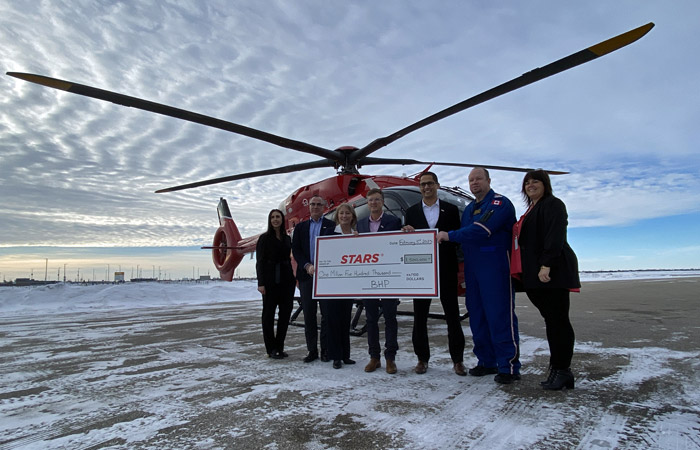A generous $1.5 million donation from BHP Canada Inc. was recently announced by STARS. The gift continues BHP’s investment in the health and safety of communities across Western Canada by supporting STARS’ mission operations, as well as contributing to its new fleet of helicopters.
BHP has been a long-time supporter of STARS, and this latest commitment brings the resource company’s total support of the charitable air ambulance organization to more than $6.3 million since 2012.
“There is nothing more important to BHP than the health and safety of our employees, contractors, and communities where we operate. The life-saving services that STARS provides throughout the province are absolutely critical, and we are proud to continue to support their work,” said Simon Thomas, President, Potash for BHP. “Our investment in STARS furthers our commitment to the people of Saskatchewan in helping to ensure critical care is available when it is most needed.”
As a non-for-profit organization, STARS relies on its donors to help achieve excellence and drive innovation. BHP’s gift will ensure anyone who needs assistance will continue to receive the best in emergency critical care anywhere its needed, with the latest in flight and technical capabilities offered by the new H145.
“With this generous gift to our operations and fleet renewal initiative, BHP is truly making a generational investment in the health and safety of the communities we serve,helping us deliver critical care to urban and rural patients living, working or playing across Western Canada, ” said Terri Strunk, STARS’ Chief Fundraising and Brand Officer.
STARS has flown hundreds of missions in the new helicopters since receiving its first H145 aircraft in 2019.Thanks to the support from donors like BHP, the renewed fleet has now entered service at all six STARS bases across Western Canada.
“BHP has been a steadfast and loyal ally of STARS since we started in Saskatchewan over ten years ago,” said Strunk. “We’re incredibly grateful for their unwavering support, helping us continue to care for the next patient who needs us, wherever they may need us, for decades to come.”





